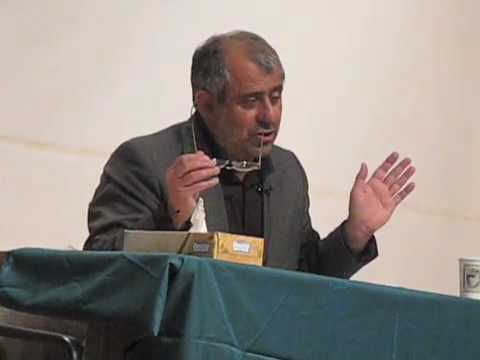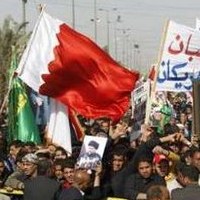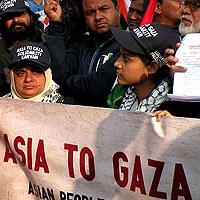![]()
Sun, April 10, 2011 | The Meir Amit Intelligence and Terrorism Information Center
Iran: Exiled Reformist Cleric Calls for Public Debate on Nuclear Issue
Reformist cleric Hojjat-ol-Eslam Hassan Yousefi Eshkevari, currently in exile in Germany, published an extraordinary article last week warning about the dangers of Iran’s nuclear facilities and calling for a public debate about those dangers.
In the article, published on Jaras, a website affiliated with the supporters of reformist opposition leader Mir-Hossein Mousavi, Eshkevari claims that the earthquake in Japan and its impact on the nuclear reactors in Fukushima have demonstrated the need to examine the safety of Iran’s nuclear facilities. Japan is an advanced country that allows internal and external public monitoring of its nuclear facilities; therefore, Eshkevari says, one can safely assume that it has taken the necessary measures to secure its nuclear facilities. In a country like Iran, however, there is no guarantee for the nuclear facilities to be immune to devastating impact of natural disasters.
The threat to world peace, according to the reformist cleric, has nothing to do with the question of whether Iran intends to produce nuclear weapons, but rather with the safety of its nuclear facilities, which pose a threat to people in Iran, in the region, and elsewhere in the world. Since Iran, according to Eshkevari, is ruled by a tyrannical government that follows an adventurous policy, there is no guarantee that required security protocols are maintained in its nuclear facilities, or that they are properly monitored to keep them safe.
In the article, Eshkevari criticized Western governments for focusing their criticism against Iran’s nuclear program on its drive for nuclear weapons. The international community’s objections to the nuclear program are based on political and economic interests rather than the human aspects involving the safety of the nuclear facilities and their impact on the environment and the lives and health of Iranians. Instead of being a political issue, the question should involve protecting the environment and the lives of human beings. The criticism, according to Eshkevari, should not be focused on Iran’s right for nuclear energy under the simplistic slogan “Nuclear energy is our inalienable right” used by the Islamic republic for PR needs, or on Iran’s need to achieve scientific progress and harness nuclear technology. The debate on Iran’s nuclear program should be focused on the lack of proper guarantees to ensure the safety of its nuclear facilities under the current political conditions. When there is no democracy, internal and external monitoring, and a responsible government in Tehran, a nuclear disaster in Iran is a rather likely scenario.
At a time where in many countries around the globe, including such democratic and industrial nations as Germany, there has been growing opposition to nuclear programs and calls to shut down nuclear reactors, it is necessary to focus rather on the threats posed by the nuclear programs of such countries as Iran, Pakistan, and Israel — as they are unmonitored, they are cause for much greater concern.
Eshkevari called on Iranian peace and environment activists to launch a campaign to express their criticism of Iran’s nuclear facilities and increase public awareness about the dangers associated with their safety. It is time for intellectuals and peace and justice activists worldwide holding various political and social views to pay attention to this issue and cooperate to prevent a possible disaster. Such a campaign, according to Eshkevari, can also be based on religious views, since the large religions dictate a duty of environment conservation and prevention of damage to nature (Jaras, March 29).
Hassan Yousefi Eshkevari is considered one of the most important reformist thinkers in recent years. He was sentenced to seven years in prison on charges of sedition after taking part (with other major Iranian reformist activists) in a political conference in Berlin in 2000. He was released from prison in 2005. Even after his release, Eshkevari continued strongly criticizing the Iranian regime and currently resides in Germany.
Meanwhile, Naser Rastkhah, deputy chief of the Atomic Energy Organization and head of its nuclear safety center, reported this week that the organization recently installed two systems to warn about radiation threats and monitor radiation levels in Iran’s nuclear facilities.
Speaking at a conference held at the Atomic Energy Organization headquarters in Tehran, Rastkhah said that the nuclear safety center had recently launched a new system to warn about radiation threats from the nuclear facilities in Tehran or in neighboring countries. It was first deployed in 13 Iranian cities, including Tehran and Bushehr, and recently expanded to 50 cities across the country. The system is supposed to warn about radiation levels through stations that constantly monitor gamma rays and relay the data to the Atomic Energy Organization headquarters in Tehran. It operates on optic fibers and is not connected to the internet (ISNA, April 4).
Public debate on the nuclear issue is practically prohibited in Iran. Even after the earthquake in Japan, Iranian media avoided any discussion on the safety of the country’s nuclear facilities in case of an earthquake. In recent years, however, other voices on the nuclear issue have been heard from intellectuals and a few reformist academia members, including Prof. Sadegh Zibakalam and Dr. Ahmad Shirzad.



 RSS
RSS











#Iran: Exiled Reformist Cleric Calls for Public Debate on #Nuclear Issue | http://j.mp/hlZm8n
#Iran: Exiled Reformist Cleric Calls for Public Debate on #Nuclear Issue | http://j.mp/hlZm8n
RT @CrethiPlethi: #Iran: Exiled Reformist Cleric Calls for Public Debate on #Nuclear Issue | http://j.mp/hlZm8n